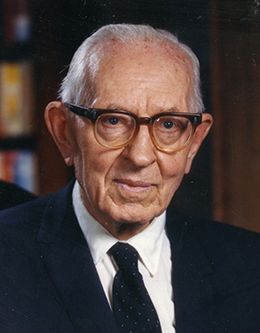Joseph Fielding Smith was born on July 19, 1876 in Salt Lake City, Utah. The son of Joseph F. Smith, the sixth president of The Church of Jesus Christ of Latter-day Saints, and the grandson of Hyrum Smith, the first patriarch in the Church, Joseph Fielding Smith inherited a legacy of undaunted faith. His lifetime would see dramatic changes in the world and the Church, but his faith remained constant.
Growing up, Joseph worked on the family farm and was educated in a semi-formal ward school. His mother was a midwife who delivered nearly a thousand babies without losing any mothers or children in childbirth; Joseph often drove her to deliveries. During Joseph’s childhood, polygamy had been criminalized by the federal government and many men in the Church were facing imprisonment or exile. Because his mother was a plural wife of his father, Joseph’s parents had to evacuate to Hawaii for several years, and when they returned, his father could not openly visit his wives or children until he received a presidential pardon in 1891.
Despite his tumultuous childhood, Joseph Fielding Smith saw happy, foundational moments in the history of the Church. As a teenager, he witnessed the dedication of the Salt Lake Temple in 1893. Later, he would serve as scribe to record his father’s revelation on the redemption of the dead that was eventually canonized.
After two years at Latter-day Saint College in Salt Lake City and several years working at ZCMI, Joseph Fielding Smith met and married Louie Emily Shurtliff in 1898. Only one year into their marriage, he was called to serve as a missionary in England. Returning home in 1901, he immediately began working in the Church historian’s office. He and Louie had two daughters.
Due to an illness related to a third pregnancy, Louie passed away in March of 1908. In November of that year, Joseph Fielding Smith married Ethel Georgina Reynolds. They would have four daughters and five sons together, making Joseph Fielding Smith the father of eleven children. In 1910 he was called as a member of the Quorum of the Twelve Apostles. He served on the YMMIA (later called the Young Men) general board and as Church historian and recorder.
Tragedy continued to strike the Smith family. Ethel passed away from a cerebral hemorrhage in 1937, followed a few years later by their son Lewis who was killed in World War II. In 1938, Joseph Fielding Smith married Jessie Ella Evans, an accomplished opera singer, who would accompany him on many of his tours and Church assignments around the world.
During his six-decade tenure as a member of the Quorum of the Twelve, including twenty years as President of the Quorum of the Twelve, his tours included missions across the United States, Europe (just before the outbreak of the war), Central and South America, and the Far East. They resulted in the dedication of a temple in London, the opening of Guam, Korea, and the Philippines to the preaching of the gospel, and the translation of temple ordinances into other languages.
Joseph Fielding Smith was particularly passionate about genealogy and temple work. He did extensive work with his own family history and made great strides in encouraging and enabling members of the Church to do likewise. He served on the Salt Lake Temple Presidency and frequently spoke on the importance of the family and sacred temple covenants. He also designated Monday nights for Family Home Evenings, believing that amid the demands of the world and the Church, families need time to be together.
In 1970, Joseph Fielding Smith became the tenth President of the Church. He passed away only two years later and was buried in Salt Lake City. A member of the Board of Trustees and the Church Board of Education, he visited and addressed the Brigham Young University audience many times. His conservative views on the scientific and social advances of his time reflected the dramatically different world he had grown up in. However, his rigid courage also allowed him to lead the Church despite his own personal trials and amid soul-stretching growth and change. His addresses demonstrate his love for God, for the Church, and for those whom he served.


